Is there a difference in solar panels? There really is. Some are rubbish and in-efficient.
Among the many parameters, you should consider when purchasing a set of solar panels is their energy efficiency.
Essentially, it’s an indication of how hard they work for their money since it is a measure of the amount of sunlight (irradiation) that hits their surface and is converted into electricity.
But what solar panels will be the most efficient in the UK market in 2025?
...let’s take a look!
PS We offer MCS-certified solar panel installation nationwide. Simply answer these questions, get your fixed price and arrange your free design.
The Most Efficient Solar Panels in the UK
Here are the most efficient solar panels available in the UK from 1st to 8th (notably all of these panels offer no less than 22% efficiency):
#1 REA Fusion Energy Solar Panels

Efficiency
22-24%Cost per panel
£400 to £420
The REA Fusion Solar Panels are made from high-efficiency N-type M10 Topcon solar cells and offer a seamless, sleek design that is available in two popular colours - black or silver.
Each panel is bifacial (double-sided) providing even more power than single-sided panels, which are double-glazed for maximum longevity. They are also micro-inverter-optimised to work together with micro-inverters from Enphase.
This unique combination of innovative solar technology enables the panels to generate electricity, even in low light conditions, which is ideal for a country like the UK - where cloudy days are common throughout the year.
Each panel works together with its own Enphase microinverter that converts the DC power generated by the panel into AC power that can be used in your home immediately - AC is what household appliances and circuits use and it is also much safer than a DC current.
It also means the panels will start generating electricity in low light (requiring just 22 volts) – compare this to typical panels that utilise a string inverter that requires at least 200 volts to even begin energy generation - again, this makes them perfect for a cloudy place like the UK.
The microinverter design also means that each panel is able to work at its full capacity and maximise the performance of each solar panel independently.
Contrast this to a solar panel system that uses a traditional string inverter - if one panel's performance is impacted by shade or dirt, multiple other panels' performance will also drop, which is a significant disadvantage.
As mentioned, the micro-inverter (AC)-optimised design makes this solar system safer too - each panel is earthed and can be protected by an RCD board (fuse box), so is much safer than traditional DC systems and it also means it will continue to work in the event of a power cut (DC systems won't).
The high-efficiency crystalline double-sided design gives these panels a much larger solar surface area and so unlike many leading competitors that only have a single side, these panels can generate electricity on both sides - increasing their max power output by 10%.
PS You can check out our complete review of the REA solar panels in our YouTube video below:
The double-glazed design means they are not susceptible to delamination, which is a common issue in inferior panels that over time causes the solar panel components to start detaching from each other.
Each panel’s performance can also be monitored via a user-friendly application, allowing you to see how the weather is impacting performance or detect whether something may be wrong with one of the panels quickly and conveniently.
Lastly, these panels come with a 25-year product and performance warranty, which unlike any other company we are aware of is backed by an insurance company and not the manufacturer.
This can offer peace of mind that you will still be covered, even in the very unlikely event that the manufacturer stops trading.
Pros:
Low-light-optimised solar panels - perfect for the UK
AC optimised for maximum safety
Bi-facial - both sides generate power
25-year insurance company-backed product & performance warranty
24-hour monitoring of each solar panel
Cons:
More costly than other options
Check out the average costs of solar panels here.
Explore a Solar Case Study: Check out an insightful Q&A session featured in one of our detailed case studies on domestic solar panels. Hear directly from a Heatable customer in the UK and gain valuable perspectives on their experience here.

The image above shows a 23-panel solar installation, carried out by the MCS-certified solar team at Heatable, featuring the REA Fusion2 solar panels.
#2 SunPower Maxeon 6 AC
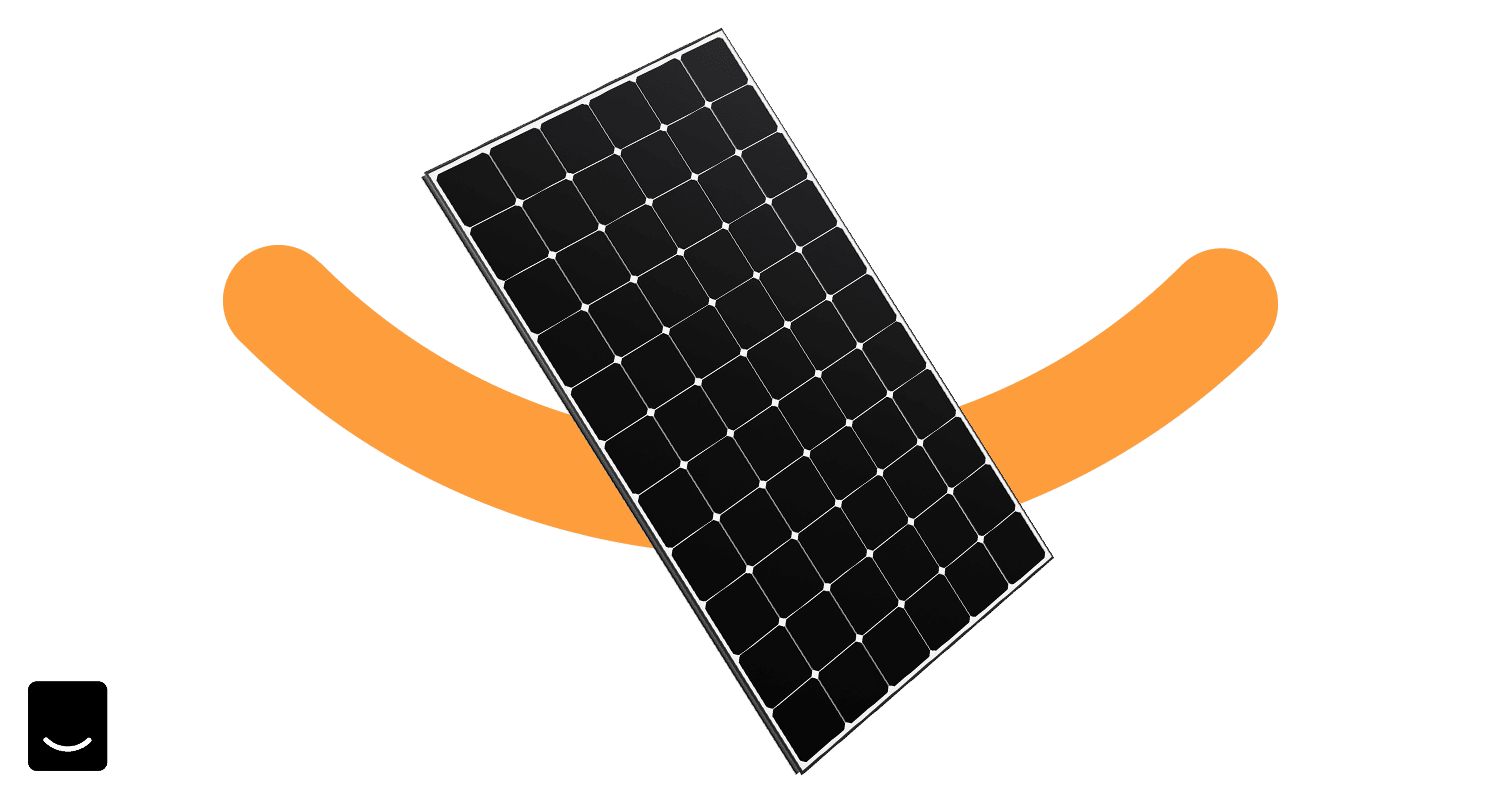
Energy efficiency: 22.8%
Cost per panel: N/A
As you’ll notice, SunPower has two of the most energy-efficient solar panels on the market, falling just shy of the REA solar panels.
SunPower is a British industrial power supply specialist founded in Berkshire in 1995. The company decided to capitalize on Britain’s image as a sunny destination and has been doing well since.
From their top-notch solar panel range, the Maxeon 6 AC comes in second when it comes to efficiency with 22.8%, just edging ahead of the Maxeon 3.
The Maxeon 6 AC is not only efficient but powerful as it offers 440 watts (the average output of solar panels ranges from 250-400 watts).
Moreover, SunPower offers a 40-year product warranty with the Maxeon 6 AC and guarantees 92% of its original performance after 25 years. With that percentage, the Maxeon 6 AC will probably outperform most millennials in 25 years.
The SunPower Maxeon 6 AC is also an eco-friendly product since these panels are recycled. That means you’re getting super green solar panels (not that they were your neighbours before). However, with a weight of 21.8kg, the Maxeon 6 AC is a little heavy.
Join Thousands of Satisfied Customers:
We’re proud to be MCS accredited and Which? Trusted solar installers with over 10,000 glowing reviews on Trustpilot. Discover why so many trust us for their solar panel installations—visit our Reviews and Testimonials page and watch Phil’s video testimonial below.
#3 SunPower Maxeon 3

Energy efficiency: 22.7%
Cost per panel: £300 to £350
Next, we have the SunPower Maxeon 3. With an energy efficiency of 22.7%, it falls just shy of its sibling product, the Maxeon 6 AC. Their absence from this list altogether truly makes Maxeon 4 and 5 the middle children.
While both panels come with a 40-year product warranty, the Maxeon 3 has a different performance warranty, that being 88.25% after 40 years.
All the same, the warranties offered by both the Maxeon 6 AC and Maxeon 3 are well above average.
These panels are also recycled, which makes them a better eco-friendly alternative than eating vegan. At 21.2kg each, Maxeon 3 panels are a little lighter than the Maxeon 6 AC, but still above the weight of an average solar panel. The Maxeon 3 is also somewhat more heat resistant.
Related solar guides:
#4 Yingli Solar YLM GG 120 Cell
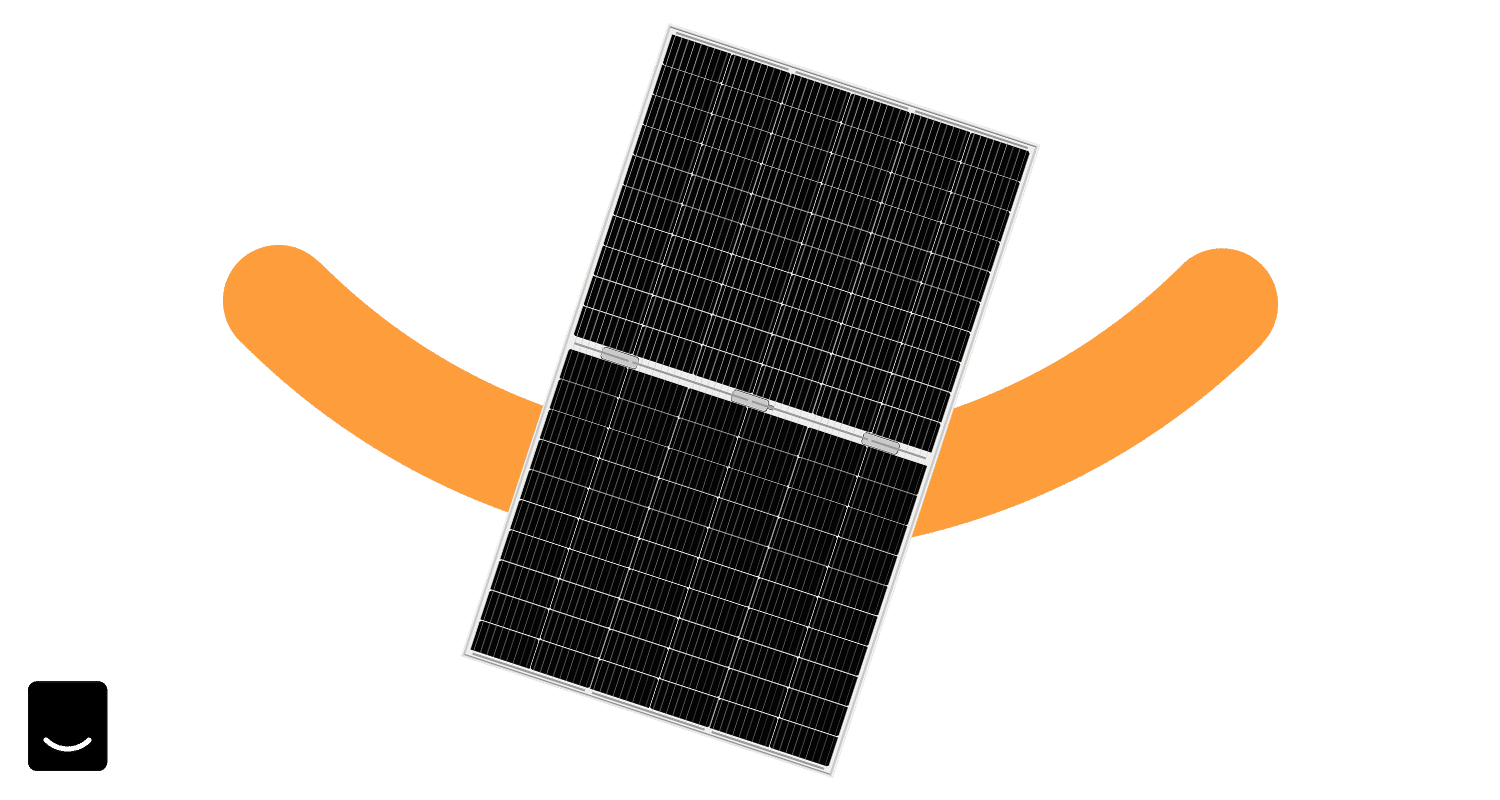
Energy efficiency: 22.5%
Cost per panel: N/A
The next big name to appear on our list is Yingli Solar.
This Chinese solar manufacturer was founded in 1998 and has since grown to become one of the largest producers of solar panels worldwide.
Their YLM GG 120 Cell is the most efficient panel offered by the brand, with a rating of 22.5%, lagging behind the REA Fusion Panels.
Aside from its high efficiency, this panel comes with a stable power output of 380 watts. That’s much more efficient than using a stationary bike, which produces 100 watts and requires you to work out instead of lying in the sun.
However, its warranties aren’t as impressive as those offered by SunPower as this product features a 12-year product warranty and a performance warranty of 85% after 25 years.
Furthermore, this panel weighs 23.2kg, making it heavier than the two SunPower options mentioned above. That makes it the worst option if you’re living in a tent.
Still, learning about solar? Check out our guides on how many solar panels you need and how solar car charging works.
#5 Yingli Solar Panda Bifacial 144 Cell
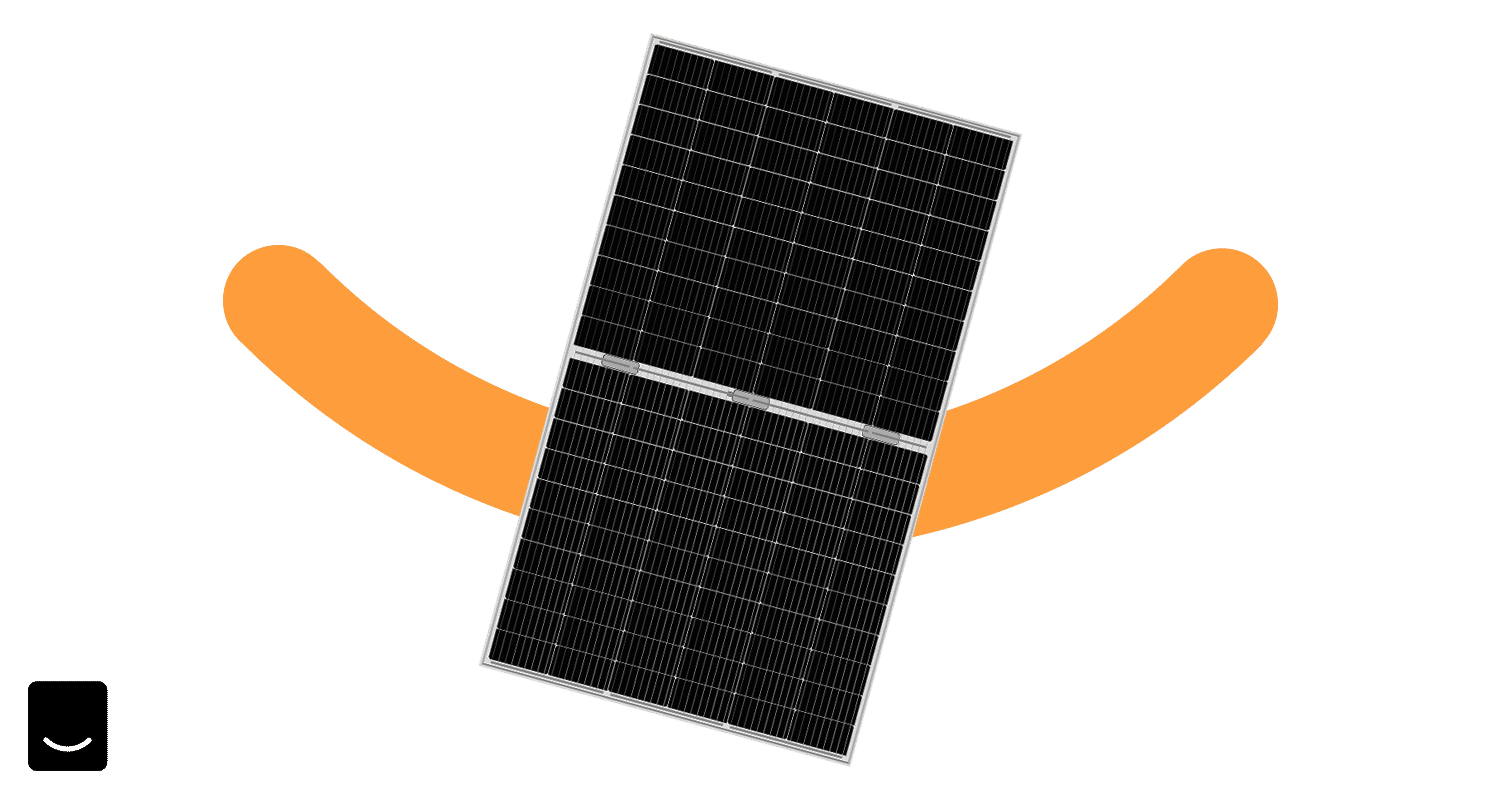
Energy efficiency: 22.5%
Cost per panel: N/A
Yingli Solar’s Panda Bifacial 144 Cell also has an efficiency of 22.5%. Moreover, it has a higher output of 415 watts.
Beyond that, it has the same 12-year product warranty as the YLM GG 120 Cell, as well as a slightly better performance warranty of 85.5% after 25 years.
Also, at 26kg, it’s one of the heaviest products on this list, which is why we think it’s named after a bear known for eating all day long.
And as with any solar panel, before having a solar array installed on a roof, always have a professional verify that 1. you have a roof, and 2. your roof will be able to support the weight required. If not, your roof may require some work.
Lastly, both Yingli Solar panels discussed today have below-average heat resistance levels, as they lose 0.35% of their power output for every degree Celsius of temperature increase.
Wondering how different solar installers compare? Check out our in-depth solar installer comparison here.
#6 REC Alpha Pure-R
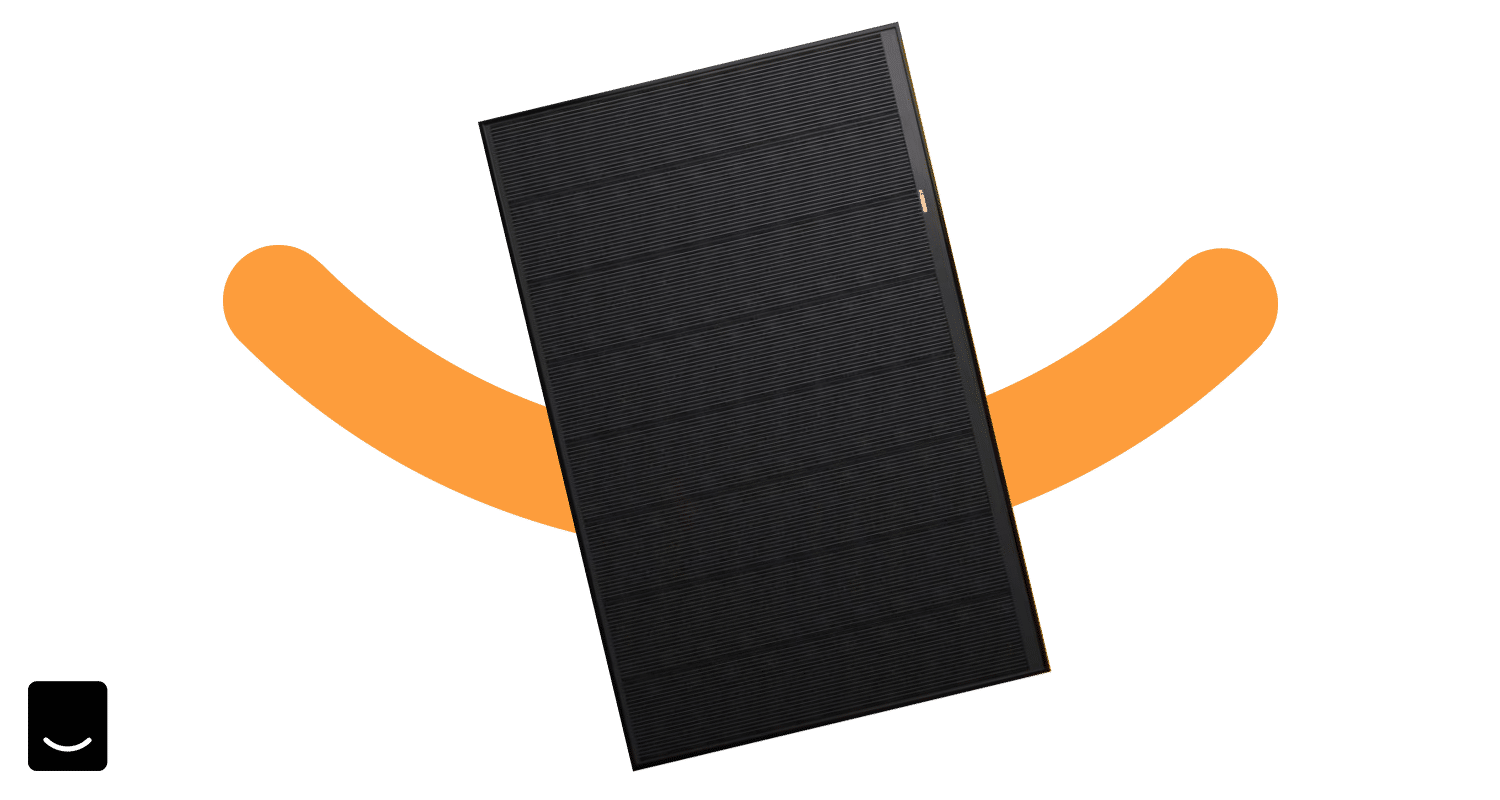
Energy efficiency: 22.3%
Cost per panel: £250 to £300
By the time we reach the REC Alpha Pure-R, we are beginning to see more noticeable space between this panel and the most efficient SunPower Maxeon 6 AC.
However, even with half a per cent less efficiency, we are still in the territory above 22%. This is still great when compared with most panels or an ordinary roof.
The REC Alpha Pure-R also offers a strong 430 watts of power.
As for its warranties, you can get a 25-year product warranty and a performance warranty which guarantees 92% of its original performance after 25 years.
What’s more, these panels are slightly more heat resistant than even the SunPower Maxeon 3. And, from an environmental point of view, they are lead-free. Actually, they turn out to be lead-free from every perspective.
Check out our full in-depth article on whether solar is worth it in the UK.
#7 Jinko Solar Tiger Neo N-type 72HL4
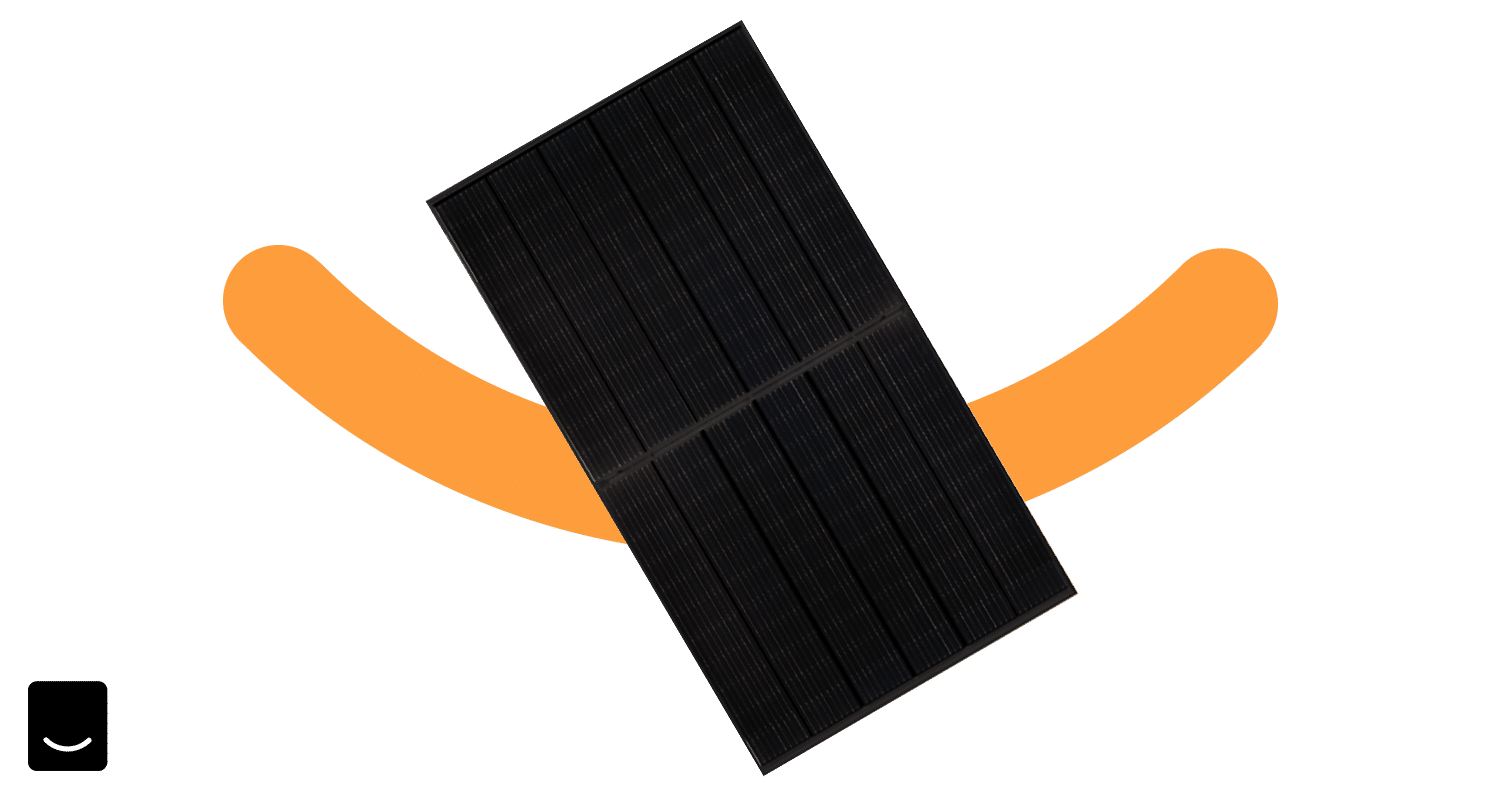
Energy efficiency: 22.26%
Cost per panel: £200 to £250
Falling slightly behind the REC Alpha Pure-R is this panel from Jinko Solar.
The Tiger Neo N-type 72HL4 offers a whopping 575 watts of power, making it by far and away the most powerful panel on this list. Its lower effectiveness makes it comparable to a very strong boxer with bad eyesight.
With that being said, this Jinko Solar product has a sub-par level of heat resistance of -0.35% per °C (the same as both Yingli Solar panels discussed earlier).
It also weighs 28kg, making it the heaviest panel on this list - and much like that strong boxer, we compared it to. As for its warranties, it has a decent 12-year product warranty but a pretty solid performance warranty that guarantees 87.4% of its original performance after 30 years.
We have also reviewed the best solar panels and covered how long solar panels last in the UK.
#8 Panasonic EverVolt EVPV410H
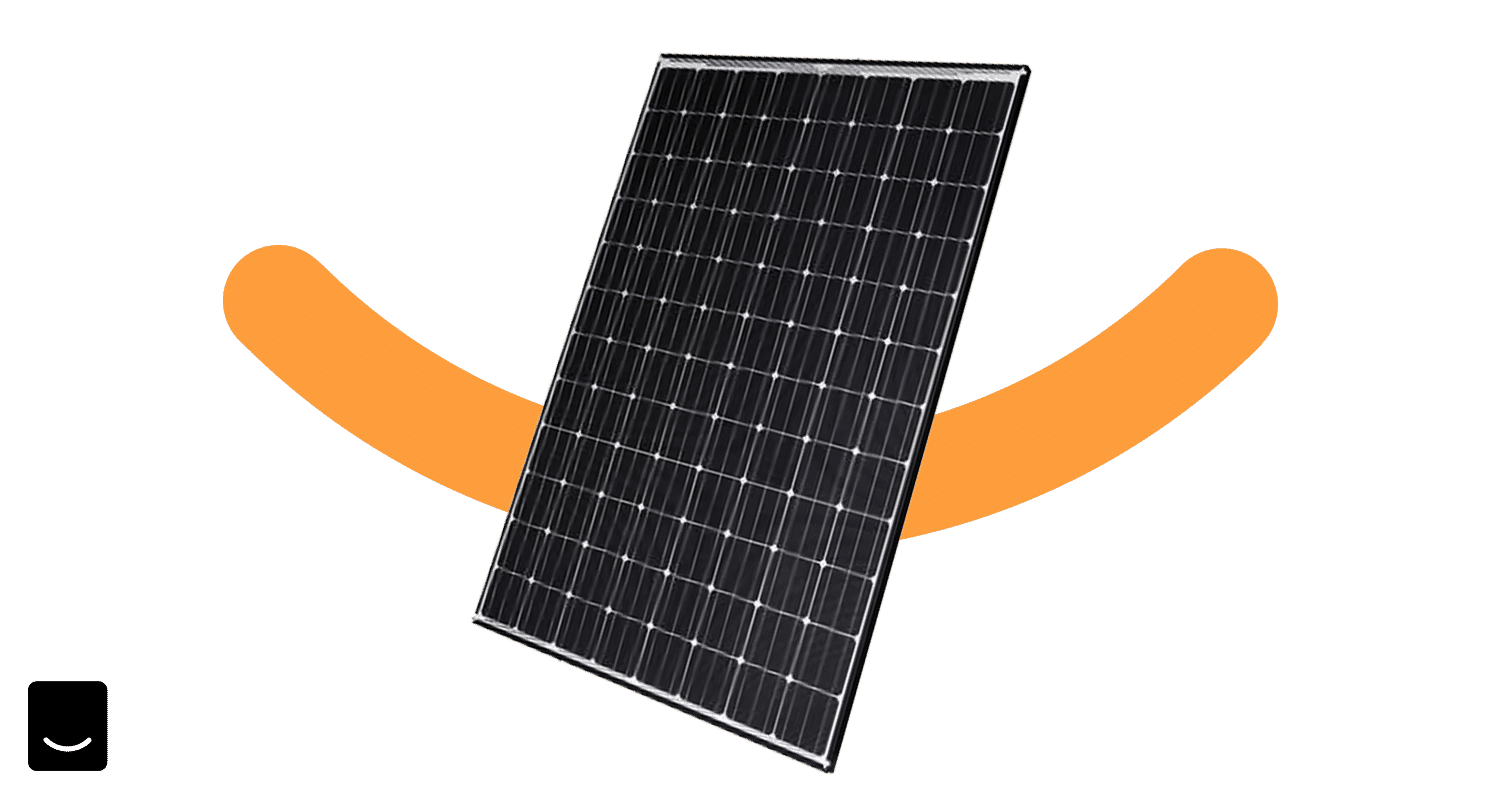
Energy efficiency: 22.2%
Cost per panel: £650 to £750
Lastly, we have Panasonic’s EverVolt EVPV410H. Along with having a good power output of 410 watts, its heat resistance stands at -0.26% per °C, making it equally (along with the REC Alpha Pure-R) the most heat-resistant panel discussed today.
This Panasonic solar panel also weighs just 20.5kg, meaning it's the lightest option on the list. However, it is more on the expensive side. Like with Lionel Messi, who is also lightweight and efficient, there’s a price to pay for quality.
In terms of warranties, the Panasonic EverVolt EVP410H comes with a 25-year product warranty and a performance warranty guaranteeing 92% of its initial performance after 25 years. Those are numbers not even Messi could guarantee.
PS Did you know that solar panels can be installed on garage roofs and that smart meters are recommended for use with domestic solar arrays.
What is solar panel efficiency?
The energy efficiency of a solar panel refers to how much of the sunlight hitting its surface is converted into electricity.
So, if a panel has an efficiency rating of 18% that means that 18% or nearly 1/5th of the solar energy reaching the panel becomes electricity.
If you’re not a fan of math, feel free to skip this paragraph. To be a little more scientific, the following calculation is used to work out how efficient a solar panel is:
Max panel power in watts ÷ (Area x 1000W/m²) x 100 = Efficiency in %.
Now that we’ve welcomed back our detouring mathematics fanatics, let’s keep going and learn that most domestic solar panels have an efficiency rate in the range of 15-22%.
These are usually monocrystalline or polycrystalline panels with the former being, on average, a little more efficient.
Often choosing a solar panel is a balancing act between budget constraints, functionality (including efficiency) and aesthetics.
What other factors are important to consider?
When choosing the right solar panels for your home, several factors can influence their performance and suitability. While your primary goal is to maximise power generation throughout the year, your budget and aesthetic preferences will also play a significant role in your decision-making process.
Here are the key factors to consider:
1. Solar Panel Efficiency
Solar panel efficiency refers to the percentage of sunlight that a panel can convert into usable electricity. Higher-efficiency panels can generate more power in a given space, making them ideal for homes with limited roof space.
Monocrystalline panels typically offer the highest efficiency rates, often exceeding 20%, while polycrystalline and thin-film panels usually have lower efficiency rates.
Your property's location, roof pitch and the amount of shading will also have an impact on energy generation, find out how much, using our free design tool.
2. Solar Panel Power Output
Power output, measured in watts, indicates the amount of electricity a panel can produce under standard testing conditions. Higher-wattage panels can generate more electricity, which is crucial for meeting your energy needs.
Prioritising higher-powered panels is often a smart choice for those with limited roof space who aim to achieve specific energy production goals. These panels can generate more electricity per square metre, maximising the efficiency and output of your solar installation even when space is at a premium.
When comparing panels, consider the total system size required to cover your household’s energy consumption or the energy production goal you have in mind.
While solar panels can generate power without direct sunlight, optimal placement at the correct angle and direction significantly impacts their efficiency. For those concerned about wildlife, proper bird proofing of solar panels helps maintain system performance and prevents damage to your investment.
3. Guarantees and Degradation Rates
Solar panels come with performance guarantees and warranties that protect your investment.
A standard performance warranty covers 25-30 years, ensuring panels maintain a certain performance level over time e.g. will produce energy at a minimum percentage of original output after a certain period of time.
Degradation rates indicate how much the panel’s efficiency will decrease annually. Panels with lower degradation rates will retain their efficiency longer, providing better long-term value.
The product warranty protects you from defects in materials and workmanship and typically ranges from 10 to 25 years.
When comparing panels, check the datasheet to find the degradation rates, performance warranty and product warranty.
Some solar panel manufacturers like REA are now offering a 25-year product warranty and a performance warranty of 85% after 25 years.
Are solar panels efficient in the UK?
We all know about the unpredictability of the British weather, so do solar panels hold their own? Well, the simple answer is yes.
But it also depends on the type of solar panels and equipment you buy. Older generations of solar panels were less efficient, but more importantly, so were older inverters.
An inverter takes the power from the sun (in DC energy form) and turns it into AC energy, which we use in our homes.
If you’re buying solar on a ‘string inverter’ (older tech), you’ll have one big inverter that needs quite a lot of energy to even fire itself up and get your solar panels going.
New generation tech — also known as microinverters — are tiny inverters on the back of each panel, essentially making them all their power plant and requiring much less light.
Essentially, this means they’ll be producing your energy early in the morning and in low light conditions that we’re used to in the UK. High-performance products such as the REA Fusion 2 panel are also dual-sided, allowing for up to 20% increased performance from the sunlight.
What should I consider when choosing a solar installer?
The solar panel industry has seen its share of challenges, particularly with newer companies offering budget installations and then going bankrupt after a few years. This often leaves customers without the necessary support or warranty they need for the future.
That’s why it’s more important than ever to perform thorough due diligence when researching solar panel installers.
We recommend seeking quotes only from companies with a proven track record. You can verify their reputation by checking third-party review platforms like Trustpilot.
Additionally, ensure the company is MCS accredited, as this indicates adherence to the high standards set by a respected industry body.
Finally, choosing a company that includes third-party insurance as part of their package can offer additional peace of mind. For example, solar installers who are members of the HIES consumer code provide various benefits, including 2-year deposit protection.
This added layer of security ensures you have support and protection throughout your solar journey.
How many solar panels do you need for your home?
This is entirely dependent upon your energy usage and the size of your property.
You’ll be able to find your usage in your energy bill and should look for your monthly kWh usage. From there, multiply that by 12 and that’s what you’re looking to offset with your solar system.
Heatable’s online solar quote tool will measure your roof and recommend a system size based on your current usage.
Sometimes you’ll be limited by the physical size of your roof, this is where installing high-performance panels pays dividends to maximise the performance of your available space.
The simplest way to get an exact rundown on the number of panels you need is to use our free solar calculator tool and draw on your roof.
Wondering how different solar installers compare? Check out our in-depth solar installer comparison here.
Next Steps For Your Solar Journey:
When planning to install solar panels for your home, there are several important factors to consider. Make sure to refer to the following guides to help you make informed decisions:
To dive deeper into these topics, head over to our advice section, check out our YouTube channel for informative videos, or read a customer case study to see how others have benefited from their solar installation.
Get a Quote for Solar Today
Without boasting you should get your solar installed with us, here's why:
Thousands of Happy Customers: We boast an average score of 4.9 on Trustpilot, outperforming the market leader.
Which? Trusted Trader: Heatable is proudly recognised as a Which? Trusted Trader.
MCS Accredited: Our accreditation by the Microgeneration Certification Scheme (MCS) ensures high-quality standards.
Exclusive Panels: We offer REA Fusion solar panels, available only through Heatable.
Consumer Protection: As members of the HIES consumer code, we provide 2-year deposit protection.
Flexible Payment Options: Choose from multiple payment methods, including finance options.
Fixed Price Guarantee: Enjoy transparency with no hidden costs.
Save Your Quote: You can save your quote and decide later.
Bespoke Design Tool: Draw your own conclusion (literally) on whether solar is worth it for you, here.






